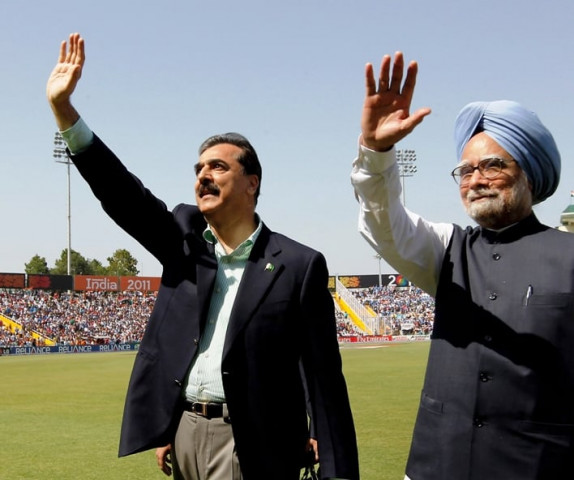Domestic minefield for Gilani on peace with India
Pakistan is still a long way from a lasting peace with India due to entrenched challenges facing the civilian govt.

The road to peace between India and Pakistan is littered with failed attempts, and Prime Minister Yousaf Raza Gilani continues to face opposition from elements within the security establishment, as well as political circles.
"It's going to be an uphill task," said one senior intelligence official. "If he pulls it off, it will be a big coup for him." Another high-profile assassination by extremists, terrorist attack in India or early elections could easily derail his attempts to make peace with New Delhi.
Further complicating Gilani's efforts, analysts say, is his government's weak domestic political position. The Pakistan People's Party-led coalition (PPP) is vulnerable to opposition charges of incompetence and corruption.
India and Pakistan have been in conflict since their bloody twin births in 1947. Since then, the two nuclear-armed foes have fought three wars and countless skirmishes. Attacks in Mumbai in 2008, which killed 166 people, heightened distrust between the two countries, which have fought over disputed Kashmir and other issues for decades. India broke off peace talks after the attack, which it blamed on Pakistan's spy agency.
The senior intelligence officer agreed that there was a need to normalise relations between the two countries. "Talks are always good," he said. "We need to redefine our relationship. We can't live in a state of perpetual animosity."
Gilani lacks broad support
Gilani's opponents say he does not have the political mandate to significantly improve ties with India.
"Gilani does not have capacity to take the process forward or forge ties," said Hafiz Hussain Ahmed, a senior leader in Jamiat-e-ulema-e-Islam (JUI), a religious party that supports peace with India. "One can imagine that a person who has been unable to improve relations with the president and handle his cabinet properly, what else you can expect from him?"
Religious and nationalist groups like the JUI could use domestic issues to hobble Gilani's government and even force early elections. The domestic economy and rising inflation is a particular source of vulnerability.
On Friday, the government raised fuel prices by 13 per cent, reflecting the rise in global crude oil prices, which sparked outrage from opposition parties and coalition partners alike. Similar proposed price hikes in the past have almost led to the collapse of Gilani's coalition.
"No government that is internally weak can be good or successful on the external front," said Ahsan Iqbal, spokesman for the right-wing Pakistan Muslim League (PML-N), the main opposition party headed by former Prime Minister Nawaz Sharif. "Unfortunately, this government suffers high dissatisfaction and lacks credibility."
As prime minister in 1997, Sharif re-opened talks with India, but an incursion into India-controlled Kashmir ordered by then Chief of Army Staff General Pervez Musharraf scuttled the talks and ultimately led to Musharraf taking power in a coup.
This means that ultimately, the military - backed by allies in the civilian bureaucracies - sets foreign policy in Pakistan, especially with regards to India. And the military and the Gilani's PPP-led government have never had good relations, said Kamran Bokhari, a senior analyst for the Middle East and South Asia for Stratfor, a private intelligence firm.
"There's a large right-wing, nationalist contingent who are very apprehensive, to say the least, about the PPP making peace with India," he said. "There's a perception - and it's pretty widespread - that the PPP is too close to the United States, too soft on India."
A senior military official, who requested not to be identified, said that the military wants good ties with India, but suggested it would be on its terms.
"We want to go ahead and this has been conveyed to the civilian leadership and they understood it well and agreed," he said.



















COMMENTS
Comments are moderated and generally will be posted if they are on-topic and not abusive.
For more information, please see our Comments FAQ